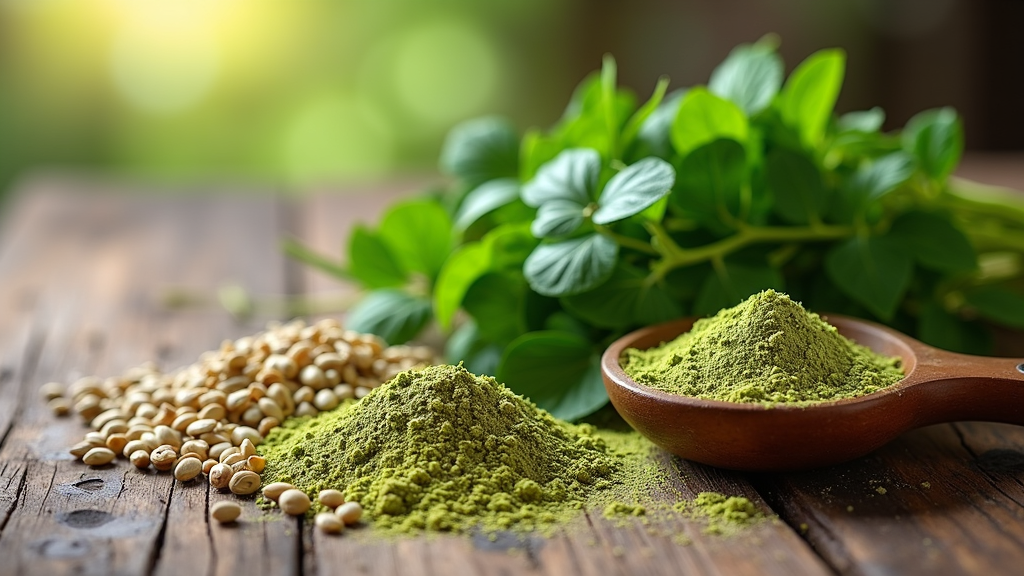 If you’re curious about superfoods and natural ways to give your health a boost, moringa definitely stands out. It’s often called the “drumstick tree” or even the “miracle tree,” which is because it offers a bunch of wellness benefits that are worth checking out.
If you’re curious about superfoods and natural ways to give your health a boost, moringa definitely stands out. It’s often called the “drumstick tree” or even the “miracle tree,” which is because it offers a bunch of wellness benefits that are worth checking out.
I first heard about moringa when I started searching for natural sources of vitamins and minerals outside the regular salad greens. After adding moringa powder to my smoothies, I noticed a difference in my energy levels, so I dug a little deeper into what makes this plant so popular. Here’s why moringa has earned a spot in my kitchen and what it might do for your health and wellness.
What Makes Moringa Special?
You might be wondering what’s so interesting about this plant. Moringa oleifera is native to parts of Africa and Asia, and almost every part of the tree is used. Leaves, seeds, pods, and even its flowers are all part of traditional diets and remedies. Moringa shows up in local foods, traditional herbal blends, and now, health food aisles everywhere. The big draw is its impressive nutrition profile and the number of ways it can support different aspects of your health.
Nutritional Breakdown – Why Moringa Packs a Punch
Moringa leaves are packed with nutrients. Here’s what you can expect from just a small serving:
- Vitamins: High levels of vitamin A, vitamin C, vitamin E, and several B vitamins (including B1, B2, and B6).
- Minerals: Calcium, magnesium, potassium, iron, and zinc are all present in decent amounts.
- Plant Based Protein: Moringa leaves contain all nine essential amino acids, which is surprisingly rare for plants.
- Fiber: Good for digestion and helping you feel fuller for longer.
I find it super handy to sprinkle moringa powder onto oatmeal or soups, especially when I need an extra nutrition boost but don’t feel like eating a full meal. It also helps that moringa is easy to add to all sorts of recipes. For many, it’s an effortless way to get more nourishment daily.
Antioxidant Power – What It Means for Your Body
Antioxidants help your body fight off free radicals, which are unstable molecules that can damage your cells. Moringa offers a steady supply of natural antioxidants, including quercetin, chlorogenic acid, and vitamins C and E.
- Protects Against Oxidative Stress: Regularly eating foods high in antioxidants may help tone down the long-term wear and tear that might lead to chronic illnesses, such as heart disease and diabetes.
- Younger Looking Skin: With its vitamin E content, moringa can help keep your skin looking fresh and resilient. I’ve even come across DIY moringa face masks!
If you’re thinking about ways to protect your day to day health, getting more antioxidants from a natural source like moringa is a pretty solid move.
Natural Anti Inflammatory – Soothing Your Body from the Inside
Moringa contains plant compounds that have anti inflammatory effects. That’s great news for anyone dealing with occasional aches or looking for ways to support joint health, especially after exercise.
- Relief for Stiff Joints: Some people say they feel less joint discomfort after adding moringa to their diet.
- Chronic Inflammation: Ongoing inflammation can lead to bigger health issues, and moringa’s compounds may help keep things balanced.
When I tried adding moringa for post workout recovery, I noticed I felt less sore the next morning. That’s always a win, especially after a tough workout session.
Blood Sugar Support – A Handy Bonus
Moringa could be good news if you’re keeping an eye on your blood sugar. Some small studies suggest that moringa leaf powder helps lower post meal blood sugar spikes.
- Improved Insulin Sensitivity: There’s early evidence that moringa may make your cells more responsive to insulin, which can be helpful for people with blood sugar swings.
- Everyday Blood Sugar Balance: Adding moringa to your daily routine, whether it’s sprinkled on food or brewed as tea, can support more stable energy throughout the day.
It’s smart to keep up with your usual healthy habits, but moringa can work as another tool in your wellness kit if you’re looking to balance blood sugar.
Heart Health – A Little Extra Support
Moringa is often used in traditional medicine to support a healthy heart. It works in a few different ways:
- Cholesterol Lowering Effects: Some research shows that moringa can help lower LDL (“bad”) cholesterol and raise HDL (“good”) cholesterol.
- Blood Pressure: The potassium in moringa can help your body manage sodium better, which means it’s great for keeping blood pressure in check.
- Circulation: Its combination of antioxidants and minerals helps keep blood vessels healthy and flexible.
Even though moringa alone won’t fix heart issues, it adds a simple layer of natural support to your daily meals.
Brain and Mood – A Surprising Boost
I was surprised to learn that moringa may also support your mental focus and mood. Its B vitamins, tryptophan, and antioxidants all play a part here.
- Mental Sharpness: B vitamins in moringa are known for helping with energy and brain function, so you might feel a bit more alert after making it part of your morning routine.
- Mood and Sleep: Some people say moringa helps them feel calmer or sleep better, maybe because it has nutrients involved in serotonin production.
I’ll sometimes reach for moringa powder blended in a late afternoon smoothie if I’m feeling sluggish and need to get back on track for the rest of the day.
Gut Health and Immunity – Staying Resilient
Moringa isn’t just full of vitamins. It also has antibacterial and antifungal compounds.
- Helps with Digestive Balance: By keeping some harmful bacteria and fungi in check, moringa can support better gut health.
- Immune Support: The high vitamin C and plant compounds in moringa help your immune system stay ready to respond.
- Gentle Detox Benefits: Moringa is sometimes used as part of natural detox routines (especially when made into a tea), but it’s more about supporting your body’s regular filtering and elimination processes than being a true “cleanse.”
I like adding moringa tea during colder months when I want a simple, comforting drink that also gives my body a little boost. You can also find moringa infused snacks and even health shots at some juice bars these days – a sign of just how much attention this plant is getting in nutrition circles.
Different Ways to Use Moringa
One of my favorite things about moringa is how flexible it is. Here’s how you can use it:
- Fresh Leaves: Easily tossed into salads or soups (though these are harder to find in some areas).
- Dried Leaf Powder: Super easy to scoop into smoothies, baked goods, or even yogurt.
- Moringa Tea: Brewed from dried leaves; it has a mild, earthy taste and can be enjoyed hot or cold.
- Supplements: Capsules or tablets for convenience, especially if you travel or want a consistent dose.
- Seeds and Oil: Sometimes used for skincare or as a more potent (and bold tasting) supplement.
Personally, the powdered form is my go to. Both for how easy it is to mix in, and for that subtle, slightly nutty flavor that goes with almost anything. If you’re a food lover, you can even experiment with moringa in pancake batter or sprinkle it on popcorn for a nextlevel cool twist!
Are There Any Side Effects or Precautions?
Like a lot of natural supplements, moringa is pretty gentle, but there are a few things to keep in mind:
- Medication Interactions: Moringa can interact with meds for blood pressure, thyroid, or blood sugar. If you’re on prescribed medication, it’s a good idea to check with your doctor first.
- Pregnancy Caution: While the leaves are considered safe in foodlike amounts, high doses or moringa’s root and bark are not recommended for pregnant women.
- Digestive Upset: If you’re new to moringa, start with a small amount to see how you feel. Too much at once can lead to nausea or a mild stomach ache.
When I first tried moringa, I stuck to about half a teaspoon of powder per day, then slowly increased as I got used to it. Small steps help your body adjust without any surprises.
What to Look for When Buying Moringa
The quality of your moringa really matters. Here’s what I pay attention to before adding a pack to my cart:
- Choose Organic: Organic moringa products are less likely to have pesticides or unwanted additives.
- Check the Color: Leaf powder should be a vibrant green color. A dull brown or yellowish tint means it’s likely older or lower quality.
- Source Matters: Moringa grown in areas with good farming practices (like India, some African countries, or highstandard suppliers elsewhere) tends to be higher quality.
Reading reviews and checking for certifications always helps me pick the best option. I also keep it tightly sealed and out of sunlight to keep it fresh for longer.
Should You Add Moringa to Your Routine?
- If you want simple ways to add extra vitamins, minerals, and protein to your meals, moringa is worth a try.
- If you’re focusing on natural options for supporting your immune system, skin, or energy, it’s definitely easy to work into your routine.
- Just remember to start low, check with your healthcare provider if you’re unsure, and pay attention to how your body responds.
I keep moringa on hand for those times when I want to make my nutrition a little more interesting. If you’re curious about getting into new, plantbased superfoods, moringa is an easy way to upgrade your wellness adventure. Try it in different dishes, pair it with your morning routine, or check out moringa smoothies at your local juice bar—there are so many fun ways to make this nextlevel cool plant part of your daily life!
